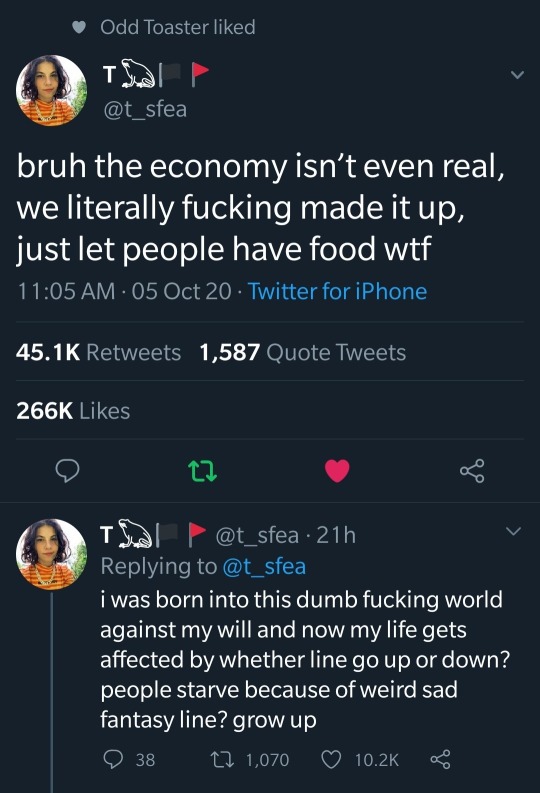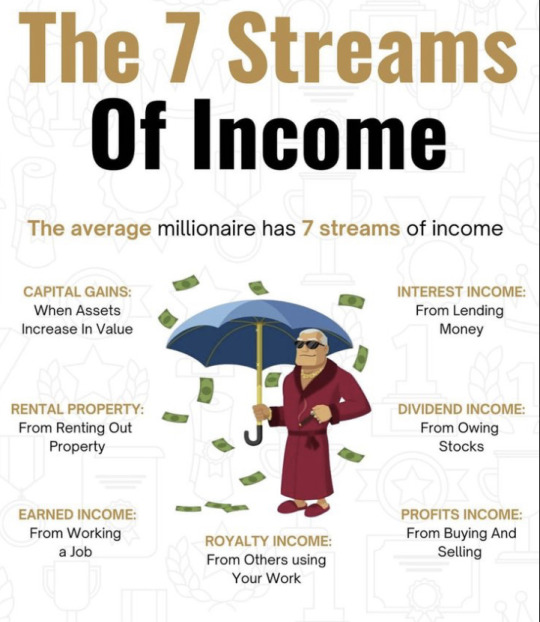#finance marketing
Text
Merchant Funding Advance - Live Links
https://www.reddit.com/user/merchantFundbusiness/comments/18hgjd2/the_best_funding_strategies_for_small_business/https://www.diigo.com/item/image/afp19/0o71
#merchant funding advance#funding business#Funding for Small Business Startup#Finance Marketing#Business
0 notes
Text

#communism#communist#socialism#socialist#social issues#economy#finance#markets#business#economics#business news#corrupt gop#democrats are corrupt#governors#alleged#billionaires#billionaire#eat the rich#tax the rich#expensive#wealth#money#luxury
3K notes
·
View notes
Text
Private equity ghouls have a new way to steal from their investors

Private equity is quite a racket. PE managers pile up other peoples’ money — pension funds, plutes, other pools of money — and then “invest” it (buying businesses, loading them with debt, cutting wages, lowering quality and setting traps for customers). For this, they get an annual fee — 2% — of the money they manage, and a bonus for any profits they make.
On top of this, private equity bosses get to use the carried interest tax loophole, a scam that lets them treat this ordinary income as a capital gain, so they can pay half the taxes that a working stiff would pay on a regular salary. If you don’t know much about carried interest, you might think it has to do with “interest” on a loan or a deposit, but it’s way weirder. “Carried interest” is a tax regime designed for 16th century sea captains and their “interest” in the cargo they “carried”:
https://pluralistic.net/2021/04/29/writers-must-be-paid/#carried-interest
Private equity is a cancer. Its profits come from buying productive firms, loading them with debt, abusing their suppliers, workers and customers, and driving them into ground, stiffing all of them — and the company’s creditors. The mafia have a name for this. They call it a “bust out”:
https://pluralistic.net/2023/06/02/plunderers/#farben
Private equity destroyed Toys R Us, Sears, Bed, Bath and Beyond, and many more companies beloved of Main Street, bled dry for Wall Street:
https://prospect.org/culture/books/2023-06-02-days-of-plunder-morgenson-rosner-ballou-review/
And they’re coming for more. PE funds are “rolling up” thousands of Boomer-owned business as their owners retire. There’s a good chance that every funeral home, pet groomer and urgent care clinic within an hour’s drive of you is owned by a single PE firm. There’s 2.9m more Boomer-owned businesses going up for sale in the coming years, with 32m employees, and PE is set to buy ’em all:
https://pluralistic.net/2022/12/16/schumpeterian-terrorism/#deliberately-broken
PE funds get their money from “institutional investors.” It shouldn’t surprise you to learn they treat their investors no better than their creditors, nor the customers, employees or suppliers of the businesses they buy.
Pension funds, in particular, are the perennial suckers at the poker table. My parent’s pension fund, the Ontario Teachers’ Fund, are every grifter’s favorite patsy, losing $90m to Sam Bankman-Fried’s cryptocurrency scam:
https://www.otpp.com/en-ca/about-us/news-and-insights/2022/ontario-teachers--statement-on-ftx/
Pension funds are neck-deep in private equity, paying steep fees for shitty returns. Imagine knowing that the reason you can’t afford your apartment anymore is your pension fund gambled with the private equity firm that bought your building and jacked up the rent — and still lost money:
https://pluralistic.net/2020/02/25/pluralistic-your-daily-link-dose-25-feb-2020/
But there’s no depth too low for PE looters to sink to. They’ve found an exciting new way to steal from their investors, a scam called a “continuation fund.” Writing in his latest newsletter, the great Matt Levine breaks it down:
https://news.bloomberglaw.com/mergers-and-acquisitions/matt-levines-money-stuff-buyout-funds-buy-from-themselves
Here’s the deal: say you’re a PE guy who’s raised a $1b fund. That entitles you to a 2% annual “carry” on the fund: $20,000,000/year. But you’ve managed to buy and asset strip so many productive businesses that it’s now worth $5b. Your carry doesn’t go up fivefold. You could sell the company and collect your 20% commission — $800m — but you stop collecting that annual carry.
But what if you do both? Here’s how: you create a “continuation fund” — a fund that buys your old fund’s portfolio. Now you’ve got $5b under management and your carry quintuples, to $100m/year. Levine dryly notes that the FT calls this “a controversial type of transaction”:
https://www.ft.com/content/11549c33-b97d-468b-8990-e6fd64294f85
These deals “look like a pyramid scheme” — one fund flips its assets to another fund, with the same manager running both funds. It’s a way to make the pie bigger, but to decrease the share (in both real and proportional terms) going to the pension funds and other institutional investors who backed the fund.
A PE boss is supposed to be a fiduciary, with a legal requirement to do what’s best for their investors. But when the same PE manager is the buyer and the seller, and when the sale takes place without inviting any outside bidders, how can they possibly resolve their conflict of interest?
They can’t: 42% of continuation fund deals involve a sale at a value lower than the one that the PE fund told their investors the assets were worth. Now, this may sound weird — if a PE boss wants to set a high initial value for their fund in order to maximize their carry, why would they sell its assets to the new fund at a discount?
Here’s Levine’s theory: if you’re a PE guy going back to your investors for money to put in a new fund, you’re more likely to succeed if you can show that their getting a bargain. So you raise $1b, build it up to $5b, and then tell your investors they can buy the new fund for only $3b. Sure, they can get out — and lose big. Or they can take the deal, get the new fund at a 40% discount — and the PE boss gets $60m/year for the next ten years, instead of the $20m they were getting before the continuation fund deal.
PE is devouring the productive economy and making the world’s richest people even richer. The one bright light? The FTC and DoJ Antitrust Division just published new merger guidelines that would make the PE acquire/debt-load/asset-strip model illegal:
https://www.ftc.gov/news-events/news/press-releases/2023/07/ftc-doj-seek-comment-draft-merger-guidelines
The bad news is that some sneaky fuck just slipped a 20% FTC budget cut — $50m/year — into the new appropriations bill:
https://twitter.com/matthewstoller/status/1681830706488438785
They’re scared, and they’re fighting dirty.

I’m at San Diego Comic-Con!
Today (Jul 20) 16h: Signing, Tor Books booth #2802 (free advance copies of The Lost Cause — Nov 2023 — to the first 50 people!)
Tomorrow (Jul 21):
1030h: Wish They All Could be CA MCs, room 24ABC (panel)
12h: Signing, AA09
Sat, Jul 22 15h: The Worlds We Return To, room 23ABC (panel)

If you’d like an essay-formatted version of this post to read or share, here’s a link to it on pluralistic.net, my surveillance-free, ad-free, tracker-free blog:
https://pluralistic.net/2023/07/20/continuation-fraud/#buyout-groups

[Image ID: An old Punch editorial cartoon depicting a bank-robber sticking up a group of businesspeople and workers. He wears a bandanna emblazoned with dollar-signs and a top-hat.]
#pluralistic#buyout groups#continuation fraud#pe#pyramid schemes#the sucker at the table#pension plans#continuation funds#matt levine#fiduciaries#finance#private equity#mark to market#ripoffs
309 notes
·
View notes
Text
{ MASTERPOST } Everything You Need to Know about Investing for Beginners
Fundamentals of investing:
What’s the REAL Rate of Return on the Stock Market?
Do NOT Make This Disastrous Beginner Mistake With Your Retirement Funds
The Dark Magic of Financial Horcruxes: How and Why to Diversify Your Assets
Dafuq Is Interest? And How Does It Work for the Forces of Darkness?
Booms, Busts, Bubbles, and Beanie Babies: How Economic Cycles Work
When Money in the Bank Is a Bad Thing: Understanding Inflation and Depreciation
Investing Deathmatch series:
Investing Deathmatch: Managed Funds vs. Index Funds
Investing Deathmatch: Traditional IRA vs. Roth IRA
Investing Deathmatch: Investing in the Stock Market vs. Just… Not
Investing Deathmatch: Stocks vs. Bonds
Investing Deathmatch: Timing the Market vs. Time IN the Market
Investing Deathmatch: Paying off Debt vs. Investing in the Stock Market
Investing Deathmatch: What Happens in a Bull Market vs. a Bear Market
Now that we’ve covered the basics, are you ready to invest but don’t know where to begin? We recommend starting small with micro-investing through our partner Acorns. They’ll round up your purchases to the nearest dollar and invest the change in a nicely diversified portfolio of stocks, bonds, and ETFs. Easy as eating pancakes:
Start saving small with Acorns
Alternative investments:
Small Business Investing: A Kinder, Gentler Alternative to the Stock Market
Bullshit Reasons Not to Buy a House: Refuted
Investing in Cryptocurrency is Bad and Stupid
So I Got Chickens, Part 1: Return on Investment
Twelve Reasons Senior Pets Are an Awesome Investment
How To Save for Retirement When You Make Less Than $30,000 a Year
Understanding the stock market:
Ask the Bitches Pandemic Lightning Round: “Did Congress Really Give $1.5 Trillion to Wall Street?”
Season 3, Episode 2: “I Inherited Money. Should I Pay Off Debt, Invest It, or Blow It All on a Car?”
Money Is Fake and GameStop Is King: What Happened When Reddit and a Meme Stock Tanked Hedge Funds
Season 3, Episode 7: “I’m Finished With the Basic Shit. What Are the Advanced Financial Steps That Only Rich People Know?”
Wait… Did I Just Lose All My Money Investing in the Stock Market?
Season 4, Episode 1: “Index Funds Include Unethical Companies. Can I Still Invest in Them, or Does That Make Me a Monster?”
Retirement plans:
Dafuq Is a Retirement Plan and Why Do You Need One?
Procrastinating on Opening a Retirement Account? Here’s 3 Ways That’ll Fuck You Over
How to Painlessly Run the Gauntlet of a 401k Rollover
Ask the Bitches: “Can I Quit With Unvested Funds? Or Am I Walking Away From Too Much Money?”
Workplace Benefits and Other Cool Side Effects of Employment
You Need to Talk to Your Parents About Their Retirement Plan
Season 4, Episode 5: “401(k)s Aren’t Offered in My Industry. How Do I Save for Retirement if My Employer Won’t Help?”
Got a retirement plan already? How about three or four? Have you been leaving a trail of abandoned 401(k)s behind you at every employer you quit? Did we just become best friends? Because that was literally my story until recently. Our partner Capitalize will help you quickly and painlessly get through a 401(k) rollover:
Roll over your retirement fund with Capitalize
Recessions:
Season 1, Episode 12: “Should I Believe the Fear-Mongering about Another Recession?”
There’s a Storm a’Comin’: What We Know About the Next Recession
Ask the Bitches: How Do I Prepare for a Recession?
A Brief History of the 2008 Crash and Recession: We Were All So Fucked
Ask the Bitches Pandemic Lightning Round: “Is This the Right Time To Start Investing?”
#investing#how to invest#stock market#finance#personal finance#investing in stocks#retirement fund#retirement account#investing for beginners#investing 101
72 notes
·
View notes
Text
Ko-Fi prompt from Isabelo:
Hi! I'm new to the workforce and now that I have some money I'm worried it's losing its value to inflation just sitting in my bank. I wanted to ask if you have ideas on how to counteract inflation, maybe through investing?
I've been putting this off for a long time because...
I am not a finance person. I am not an investments person. I actually kinda turned and ran from that whole sector of the business world, at first because I didn't understand it, and then once I did understand it, because I disagreed with much of it on a fundamental level.
But... I can describe some factors and options, and hope to get you started.
I AM NOT LEGALLY QUALIFIED TO GIVE FINANCIAL ADVICE. THIS IS NOT FINANCIAL ADVICE.
What is inflation, and what impacts it?
Inflation is the rate at which money loses value over time. It's the reason something that cost 50 cents in the 1840s costs $50 now.
A lot of things do impact inflation, like housing costs and wage increases and supply chains, but the big one that is relevant here is federal interest rates. The short version: if you borrow money from the government, you have to pay it back. The higher the interest rates on those loans, the lower inflation is. This is for... a lot of reasons that are complicated. The reason I bring it up is less so:
The government offers investments:
So yeah, the feds can impact inflation, but they also offer investment opportunities. There are three common types available to the average person: Bonds, Bills, and Notes. I'll link to an article on Investopedia again, but the summary is as follows: You buy a bill, bond, or note from the government. You have loaned them money, as if you are the bank. Then, they give it back, with interest.
Treasury Bills: shortest timeframe (four weeks to a year), and lowest return on investment. You buy it at a discount (let's say $475), and then the government returns the "full value" that the bond is, nominally (let's say $500). You don't earn twice-yearly interest, but you did earn $25 on the basis of Loaning The Government Some Cash.
Treasury Notes: 2-10 year timeframe. Very popular, very stable. Banks watch it to see how they should plan the interest rates for mortgages and other large loans. Also pretty high liquidity, which means you can sell it to someone else if you suddenly need the cash before your ten-year waiting period is up. You get interest payments twice a year.
Treasury Bonds: 20-30 years. This is like... the inverse of a house mortgage. It takes forever, but it does have the highest yield. You get interest payments twice a year.
Why invest money into the US Treasury department, whether through the above or a different government paper? (Savings bonds aren't on sold the set schedule that treasury bonds are, but they only come in 30-year terms.)
It is very, very low risk. It is pretty much the lowest risk investment a person can make, at least in the US. (I'm afraid I don't know if you're American, but if you're not, your country probably has something similar.)
Interest rates do change, often in reaction or in relation to inflation. If your primary concern is inflation, not getting a high return on investment, I would look into government papers as a way to ensure your money is not losing value on you.
This is the website that tells you the government's own data for current yield and sales, etc. You can find a schedule for upcoming auctions, as well.
High-yield bank accounts:
Savings accounts can come with a pretty unremarkable but steady return on investment; you just need to make sure you find one that suits you. Some of the higher-yield accounts require a minimum balance or a yearly fee... but if you've got a good enough chunk of cash to start with, that might be worth it for you.
They are almost as reliable as government bonds, and are insured by the government up to $250,000. Right now, they come with a lower ROI than most bonds/bills/notes (federal interest rates are pretty high at the moment, to combat inflation). Unlike government papers, though, you can deposit and withdraw money from a savings account pretty much any time.
Certificates of Deposit:
Okay, imagine you are loaning money to your bank, with the fixed term of "I will get this money back with interest, but only in ten years when the contract is up" like the Treasury Notes.
That's what this is.
Also, Investopedia updates near-daily with the highest rates of the moment, which is pretty cool.
Property:
Honestly, if you're coming to me for advice, you almost definitely cannot afford to treat real estate as an investment thing. You would be going to an actual financial professional. As such... IDK, people definitely do it, and it's a standby for a reason, but it's not... you don't want to be a victim of the housing bubble, you know? And me giving advice would probably make you one. So. Talk to a professional if this is the route you want to take.
Retirement accounts:
Pension accounts are a kind of savings account. You've heard of a 401(k)? It's that. Basically, you put your money in a savings account with a company that specializes in pensions, and they invest it in a variety of different fields and markets (you can generally choose some of this) in order to ensure that the money grows enough that you can hopefully retire on it in fifty years. The ROI is usually higher than inflation.
These kinds of accounts have a higher potential for returns than bonds or treasury notes, buuuuut they're less reliable and more sensitive to market fluctuations.
However, your employer may pay into it, matching your contribution. If they agree to match up to 4%, and you pay 4% of your paycheck into an pension fund, then they will pay that same amount and you are functionally getting 8% of your paycheck put into retirement while only paying for half of it yourself.
Mutual Funds:
I've definitely linked this article before, but the short version is:
An investment company buys 100 shares of stock: 10 shares each in 10 different "general" companies. You, who cannot afford a share of each of these companies, buy 1 singular share of that investment company. That share is then treated as one-tenth of a share of each of those 10 "general" companies. You are one of 100 people who has each bought "one stock" that is actually one tenth of ten different stocks.
Most retirement funds are actually a form of mutual fund that includes employer contributions.
Pros: It's more stable than investing directly in the stock market, because you can diversify without having to pay the full price of a share in each company you invest in.
Cons: The investment company does get a cut, and they are... often not great influences on the economy at large. Mutual funds are technically supposed to be more regulated than hedge funds (which are, you know, often venture capital/private equity), but a lot of mutual funds like insurance companies and pension funds will invest a portion of their own money into hedge funds, which is... technically their job. But, you know, capitalism.
Directly investing in the stock market:
Follow people who actually know what they're doing and are not Evil Finance Bros who only care about the bottom line. I haven't watched more than a few videos yet, but The Financial Diet has had good energy on this topic from what I've seen so far, and I enjoy the very general trends I hear about on Morning Brew.
That said, we are not talking about speculative capital gains. We are talking about making sure inflation doesn't screw with you.
DIVIDENDS are profit that the company shares to investors every quarter. Did the company make $2 billion after paying its mortgages, employees, energy bill, etc? Great, that $2 billion will be shared out among the hundreds of thousands of stocks. You'll probably only get a few cents back per stock (e.g. Walmart has been trading at $50-$60 for the past six months, and their dividends have been 57 cents and then 20.75 cents), but it adds up... sort of. The Walmart example is listed as having dividends that are lower than inflation, so you're actually losing money. It's part of why people rely on capital gains so much, rather than dividends, when it comes to building wealth.
Blue Chip Stocks: These are old, stable companies that you can expect to return on your investment at a steady rate. You probably aren't going to see your share jump from $5 to $50 in a year, but you also probably won't see it do the reverse. You will most likely get reliable, if not amazing, dividends.
Preferred Stocks: These are stock shares that have more reliable dividends, but no voting rights. Since you are, presumably, not a billionaire that can theoretically gain a controlling share, I can't imagine the voting rights in a given company are all that important anyway.
Anyway, hope this much-delayed Intro To Investing was, if not worth the wait, at least, a bit longer than you expected.
Hey! You got interest on the word count! It's topical! Ish.
#economics#capitalism#phoenix talks#ko fi#ko fi prompts#research#business#investment#finance#treasury bonds#savings bonds#certificate of deposit#united states treasury#stocks#stock market#mutual funds#pension funds
63 notes
·
View notes
Text
The market is so prosperous and the returns are so beautiful. I can’t bear to see investors losing money in the stock market. Follow me to start your road to wealth.
108 notes
·
View notes
Text

Go to hell
#success#economy#finance#decor#marketing#skinnni#80s#black tumblr#kat dennings#beautiful model#adult model#anorexla#naomi campbell#aaliyah#girl interrupted#girl smoking#grunge#ai generated#girl in bed#tumblr girls#girlblogging#daddy's good girl#curvy girls#gisele bundchen#gorgeous#black beauty#black women#beauty#blondie#lana del ray aka lizzy grant
131 notes
·
View notes
Text
#GodMorningFriday
🌄🌄
कबीर, मांस अहारी मानई, प्रत्यक्ष राक्षस जानि।
ताकि संगति मति करैं, होइ भक्ति में हानि।।
⤵️⤵️
आध्यात्मिक जानकारी के लिए PlayStore से Install करें App :-📲
"Sant Rampal Ji Maharaj"
Watch Sadhna TV from 7'30pm daily 🖥

45 notes
·
View notes
Text

#socialism#leftist#anticapitalism#communism#anti capitalist#anti imperialism#economy#markets#business news#finance#business#economics#anti capitalism#fuck capitalism#late stage capitalism#capitalism#capitalist system#ftx
448 notes
·
View notes
Text
my christmas gift to myself is finishing up my 80s wall street stockbroker hob x goth musician morpheus fic, at last. five thousand words and i think we've FINALLY got past the existentialism and onto the smut 😂
“Hmm.” Morpheus rests his cheek on the couch cushion. The tips of his hair brush Hob’s hip. His eyes are so liquid in this light. Hob wonders if he’s hallucinating.
He reaches out, mesmerized, to touch Morpheus’s hair. Morpheus doesn’t stop him. He lets Hob pet his hair, eyes falling shut. His hair is tacky on the ends with hair spray, but soft underneath.
“I’ll tell you a secret,” Hob says, and Morpheus hums. “All those self-important traders trying to impress you with their convoluted financial instruments… they just want to hide that it’s all really a scam.”
“Is it now?” says Morpheus. “I was under the assumption it was legal.”
“Something can be a scam and technically legal. Oh, it’s all very clever. But it’s just building money on top of money with nothing real to support it. Kick out the base of the tower and it’ll all go into free fall.” He makes a whistling, falling sound, and Morpheus smirks.
“And I suppose you are better than all this.”
Hob chuckles. “Oh, no. I’m a money-grubbing little vermin, too. Just letting you in on the game. How it’s not so serious.”
“Hmm. I am a musician,” says Morpheus. As Hob figured, then. “I’m afraid it’s as serious as death.”
#i should NOT be allowed to discuss finance in fics but no one was around to stop me so yall are gonna learn about the housing market crash#just a LITTLE bit though. just a tiny bit#my writing#80s dreamling
75 notes
·
View notes
Text
price of girl smell $GSML rises 230.8% after massive supply drops due to they put me in the bath. bank of the country changes advisory from PLAY OUTSIDE IN DIRT to DO NOT SHOWER
335 notes
·
View notes
Text
I will take poll results into account next week. I’m sure the FOMC will be very grateful to hear your responses, valued citizens of the Tumblr ^.^
#federal open market committee#federal reserve#the fed#interest rates#jerome powell#polls#finance#finance polls#jay speaks
150 notes
·
View notes
Text
Want to learn how to invest?
ATTENTION CITIZENS OF BITCH NATION.
Our beloved comrade, Dumpster Doggy aka Amanda Holden, is teaching an investing workshop starting THIS SUNDAY, FEB 4. Dumpster Doggy designed this workshop as your first step toward financial freedom, and it is perfect for beginners and those who just want to understand the reasoning and mechanics behind investing.
This workshop is for you if you:
Have debt — yes, you should consider investing even if you have debt now
Don't know where to start
Want to be certain that your educational foundation is absolutely solid
Understand that investing is the key to building wealth, and know that a paycheck alone is not wealth
Don't want to work forever
Want your money to start working for you
Know that you just need to get started—no matter how small the dollar amount!
Know that education must be your foundation and that investing without knowledge is dangerous
Have a workplace retirement account
Don't have a workplace retirement account
The course costs $15. We wouldn't recommend something paid like this if we didn't believe in it, so this endorsement does NOT come lightly. Amanda is one of our ride-or-dies, and she left Wall Street so she could teach investing through a feminist lens.
But if $15 is too rich for your blood, we are offering Amanda's course FOR FREE to our Patreon donors. Sign up at the $5 level or higher and it's yours ($15-$5=$10 SAVINGS HOLY CANNOLI). We'll have the information for Patreon donors up tomorrow.
Lastly, if you can't make it live, you'll still get a recording of the workshop. So don't worry if you're not available this Sunday. Ok here are those links again:
Investing for Freedom Workshop with Dumpster Doggy
Bitches Get Riches Patreon for free access to workshop
#investing#stock market#how to invest#how to invest in the stock market#stocks#trading stocks#investors#investments#personal finance#money#money advice#money tips#making money#investing stocks#stockmarket
114 notes
·
View notes
Text
Looks like the Night Market will be back up soon!

#night market#cannot wait#won't be good for my finances but hey#I still wonder who bought the titanium caskets back then lol#amc iwtv#iwtv#amc interview with the vampire#interview with the vampire amc#iwtv amc#interview with the vampire
30 notes
·
View notes
Text

"Fuel your financial journey with the power of US stocks! 🚀 Don't just watch, be a part of the wealth revolution! 📈 Join my dynamic stock investment group, where opportunities ignite, insights flourish, and success awaits. Seize the moment, let's rewrite the story of your financial triumph together! 💪💼
#financial literacy#financialfreedom#finance#financial#economy#ecommerce#investors#investing#invest#stock market#stocks#stock#real estate#investor#self love#encouragement#encourage#selfworth#manifest#growth#grow#improvement#motivation#motivatedmindset#mindset#growthmindset#improve#quote#quotes#inspirational quotes
49 notes
·
View notes
